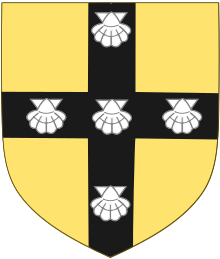Jean III de Grailly


Jean III de Grailly (aka. John De Grailly, died 7 September 1376),
Biography
He was the son of Jean II de Grailly, Captal de Buch, Vicomte de Benauges, and of Blanch de Foix, a cousin of the
Attached to the English side in the conflict, he was made
In 1364, he commanded the forces of Charles II of Navarre in Normandy, where he was defeated and captured by Bertrand du Guesclin at Cocherel.[3] After his release the following year, he defected to the French side and was made lord of Nemours by Charles V of France. However, he soon re-established his loyalty to the English, and in 1367 he went to Spain with the Black Prince, fighting at the Battle of Nájera.[5] Here he again faced Bertrand du Guesclin, but this time it was du Guesclin who was captured, and the Captal was put in charge of the prisoner. He was rewarded for his service by being made the Constable of Aquitaine in 1371.
Again fighting for the English, he commanded an English relief force when the French attacked
Froissart gives an account of the Captal de Buch's chivalry and courage at the time of the peasant uprising in 1358 called the Jacquerie (see link).
Jean de Grailly was a prisoner of the French from 1372 onwards. He had refused his freedom as it would have meant taking up arms against the king of England, which he swore never to do. His personal allegiance to the Black Prince was so strong that, upon hearing of the prince's death, he lost all resolve, refused food and died a few days later in Paris.[6]
Since he left no heirs from his marriage to Rose d' Albret,

|
|
Notes
- ^ British Museum Collection
- OCLC 247620448.
- ^ a b Nicolle & Turner 2004, p. 17.
- ^ Le Patourel 1984, p. 20-21.
- ^ Wagner 2006, p. 139.
- ^ Harvey 1976, p. 121.
- ^ Gribit 2016, p. 288.
- ^ Macauly 2010, p. 9-11.
References
- Gribit, Nicholas A. (2016). Henry of Lancaster's Expedition to Aquitaine, 1345-1346: Military Service and Professionalism in the Hundred Years War. The Boydell Press.
- Harvey, John (1976). The Black Prince and his age. London: Biddles Ltd.
- Le Patourel, John (1984). Jones, Michael (ed.). Feudal Empires:Norman and Plantagenet. London: Hambledon Continuum. ISBN 0-907628-22-2. Retrieved 26 September 2012.
- Macauly, Gregor (2010). "The Arms of the Founder Knights of the Garter". The New Zealand Armorist: The Journal of the Heraldry Society of New Zealand. 114 (Autumn 2010): 9–11.
- Nicolle, David; Turner, Graham (2004). Poitiers 1356: The Capture of a King. Osprey Publishing.
- Shaw, Wm. A. (1971). The Knights of England: A Complete Record from the Earliest Time to the Present Day of the Knights of All the Orders of Chivalry in England, Scotland, and Ireland, and of the Knights Bachelors. Baltimore: Genealogical Publishing Company. OCLC 247620448.
- Wagner, John A. (2006). Encyclopedia of the Hundred Years War (PDF). ISBN 978-0-313-32736-0. Archived(PDF) from the original on 16 July 2018.
External links
- Britannica eds. (20 July 1998). "Jean III de Grailly, lord de Buch". Encyclopædia Britannica.
{{cite web}}:|author=has generic name (help) - Froissart on the Jacquerie
